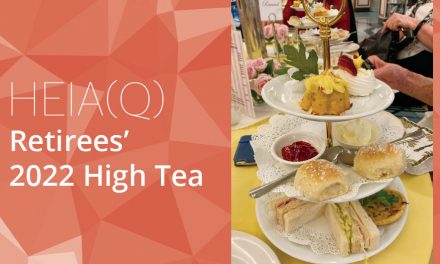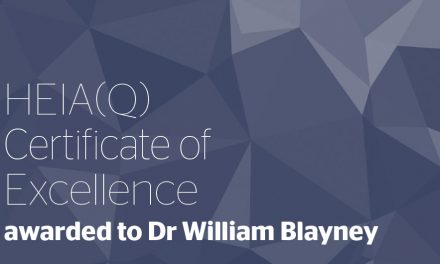In 1981 I graduated from Sydney Teachers’ College as one of the first male home economics teachers. Since then, my journey has been long and varied, but I’m still proud today to call myself a home economics teacher.

The day I graduated with Mum and Dad
Upon graduation, I was unemployed for 12 months, but during that time I picked up casual contracts at the School of Distance Education in the heart of Sydney and at Wiley Park Girls High, before finally securing a permanent position at Dunheved High School at St Marys, an outer western suburb of Sydney. I will admit, on Day One I was terrified. But in all the experiences I’ve ever had, this was an excellent grounding for anyone starting out as a teacher. I met many amazing, strong and compassionate women along the way who supported me and guided me to become the teacher I needed to be. I was at Dunheved High School for close to five years. My Head of Department was fantastic, as were the staff throughout the school. Many of us were young teachers starting out and needing support, which we got—in bucketloads.
After five years I was ready for a new challenge. I applied for a job in Brisbane as a home economics teacher at the College of Tourism and Hospitality, the new hospitality college. However, on the Thursday before Easter I received a telegram from Education Queensland to tell me I was being sent to Rockhampton to open a new college in hospitality training. At the time, I remember saying to my father, ‘Where the hell is Rockhampton?’ Mum and Dad were very supportive and drove up from Sydney with me to help me settle in.
I started working at the college in Rockhampton on 4 July 1986. As I didn’t have the skills or qualifications I needed to teach hospitality, I had to do some retraining, so I completed further study in front of house and cookery. During this time, Home Economics as a subject in Queensland was changing, and Hospitality was getting bigger. So, I proposed that we assist in retraining home economics teachers in Central Queensland to become hospitality teachers. This initiative was a pilot program for Queensland and was highly successful. At the time, I was stuck teaching Hygiene to all the chefs and waiters—luckily, I also taught Food Science to chefs, a welcome reprieve.

The day I finally got my doctorate

See what 41 yars as educator does
After 18 years working for TAFE Queensland, I got the opportunity to work part-time at CQUniversity (CQU) tutoring people transitioning from a trade to high school teaching. Eventually, I moved across to the university full time to take charge of the Vocational Education and Training (VET) programs. This was a great move as it inspired me to pursue my doctorate. Retraining home economics teachers with trade backgrounds to teach in secondary schools inspired my doctoral thesis: A case of career transitioning: trade to teacher. Basically, it described the reverse of my own journey. Completing my doctorate was the best thing I ever did as it gave me a range of skills, enabling me to become an academic and to effect positive change.
Early in my time at CQU I was introduced to Jan Reynolds, another inspiring woman. We met at the airport when Jan was returning to Brisbane after visiting Rockhampton to conduct an HEIA(Q) workshop coordinated by one of our trade-to-teacher program graduates. Jan and I discussed how HEIA(Q) and CQU could work together to strengthen home economics teacher education at CQU, especially as the Queensland University of Technology (QUT) had announced its plans to discontinue its home economics teacher-education program. Also, as QUT had recently stopped training home economics teachers, HEIA(Q) was looking for a new education sponsor for its upcoming conference. CQU was able to fill the bill! It was fate that Jan and I met that day and that, consequently, CQU is still the education sponsor for HEIA(Q)’s annual conference.

Bill Blayney (R) with the 2016 CQU Review Panel
Although CQU had been running training for pre-service teachers of Home Economics and Industrial Arts since 2000 through a distance-education model with compulsory residential workshops, nobody outside central Queensland knew about us. Twenty years ago, we had only two specialisation units in the degree, whereas now we are the only university in Australia with six dedicated units in Home Economics, along with middle- and senior-phase pedagogy. It was my job in those days to make sure that those teachers received the best training possible.
When I became Dean of CQU’s School of Education and the Arts in 2015, I continued CQU’s sponsorship of the HEIA(Q) conference. I remember getting up very early on a cold August morning in Brisbane to set up the CQU stall at the conference. Being the education sponsor, I was allowed a few minutes at the start of the day to let the participants attending know about CQU and what we were doing with pre-service home economics teacher training, including the variety of pathways into teaching we offered such as trade to teacher. I clearly remember finishing every conference presentation by saying to all participants, ‘If you can inspire one student from one of your senior classes to become a home economics teacher, our future is assured.’

Bill Blayner (R) at the CQU trade table at the HEIA(Q) 2022 conference
During one of these conferences, I met Dr Jay Deagon, whom I remember very precociously approaching me, saying, ‘You need to give me a job.’ She had just completed her doctorate in Home Economics. Little did we know that 12 months later, as I took on the new role as Dean of School, I would need a Home Economics coordinator for the school as I could not run a School of Education and the Arts with over 160 staff scattered from Geraldton to Cairns, as well as teach. So that is how Dr Jay came into my life, and how she got that job.
At the time, Jay lived in Brisbane and worked out of our Brisbane campus. It soon became very clear to me through conversations with teachers at the conferences that we needed to start offering residential schools in Brisbane as well as in regional Queensland if we wanted to keep Home Economics alive. This we did, and our numbers doubled overnight. They have been strong ever since. We have also run two course reviews since I have been Dean to make sure that our offerings meet the needs of future teachers of Home Economics with the new syllabi now including Food and Nutrition, and Design. We invited teachers from all over Australia to participate in the review process. This was and has always been my commitment to Home Economics, and as the Dean, I always found the money to do this important work.
Sadly, my time as Dean comes to an early end as after months of tests, I recently received a confronting diagnosis of Parkinson’s disease. As I reflect on my career as a teacher of over 40 years, I know Home Economics is in good hands through our continual graduates and the passionate Dr Jay Deagon. I leave behind a legacy that has students enrolled across most states of Australia to keep the flag flying.
At the recent HEIA(Q) state conference, I was also greatly honoured to receive a Certificate of Excellence from HEIA(Q) for commitment to the profession.
I was also extremely happy that the trade-to-teacher pathways for which I had been lobbying for many years were now finally recognised by the state government, which announced funding of over $10 million for this pilot pathway on 30 August 2022.
As I look towards an uncertain future of managing Parkinson’s disease, I can only hope that the replacement dean sees the value of such an important discipline area within the school and continues what I began.
Professor William (Bill) Blayney
CQUniversity





